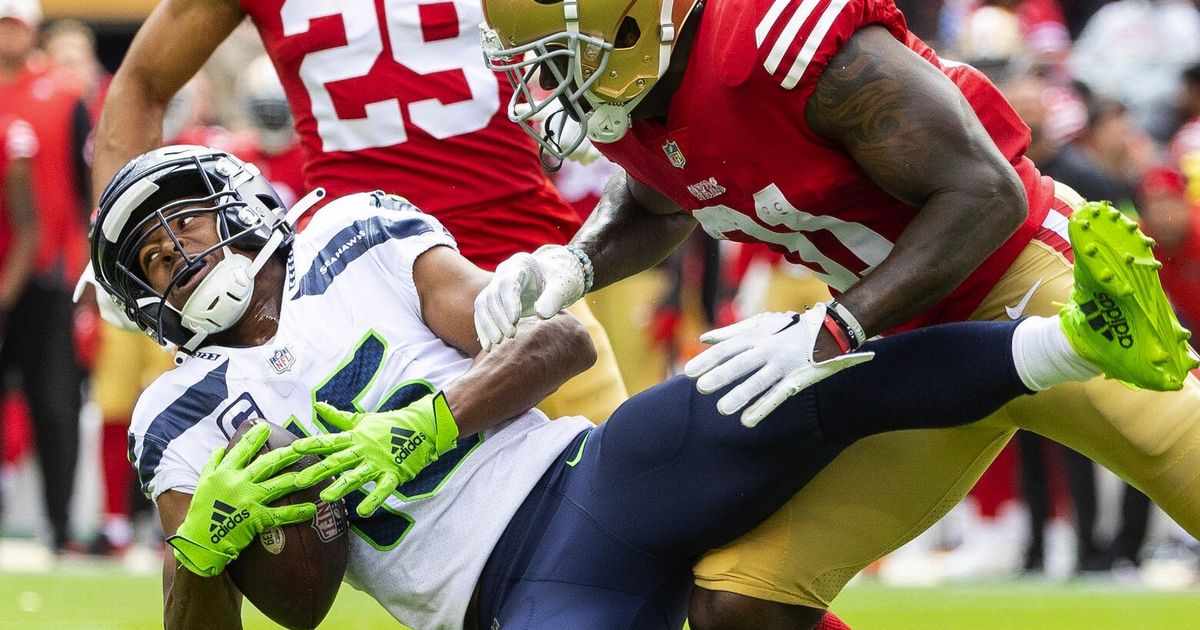
SANTA CLARA, Calif. — The emotion and elation of Seattle’s season-opening win over Denver helped gloss over a troubling trend: The Seahawks didn’t score at all in the second half in that game. In fact, they didn’t even cross midfield.
On Sunday, when that offensive inefficiency and scoring deficiency continued for four more quarters with no end in sight, there was no hiding it.
The Seahawks are still, as running back Rashaad Penny said after the game, trying to find their offensive identity. For now, however, it’s an offense marked by an inability to meld the synergy between run and pass that Pete Carroll has always viewed as the mecca of a successful game plan.
In a 27-7 loss to the 49ers at Levi’s Stadium that wasn’t even as close as the score would indicate, there was no synergy; merely a disconnected jumble of plays (and some ill-advised trickeration) that left the Seahawks perpetually out of sync.
“What a difference from one week to the next,” said Carroll, as glum after this one as he was ebullient after knocking off Russell Wilson last week. “We didn’t do anything like we wanted to today on the line of scrimmage — on either side of the ball. We didn’t deal with it right.”
The Seahawks’ seven points came courtesy of a blocked field goal by Tariq Woolen that Michael Jackson scooped up and took 86 yards to the end zone. But the part of their squad charged with scoring points, the offense, has now gone six straight quarters without doing so.
In fact, the Seahawks barely made it into San Francisco territory on offense, continuing that troubling trend. The one time they did so with a chance to change the entire tenor of the game, a trick play blew up spectacularly after the Seahawks drove all the way to the 8 trailing 13-0 in the second quarter. Running back Kenneth Walker III took the snap as a wildcat and handed off to DeeJay Dallas, a former high school quarterback, whose soft pass intended for DK Metcalf in the end zone was picked off. Carroll admitted afterward that his instincts told him call a timeout and spike the play, but he didn’t heed his spidey sense.
“It was a really cool play to call and give a shot, but it asked a lot, and in that situation, I just wish I would have got us out of it,” he said.
In the long run (which the Seahawks had far too few of), the Seahawks forced their defense to be on the field far too long, which was compounded by some tackling issues that helped prolong 49ers drives. The time of possession numbers told the story with stark precision — 38:20 for San Francisco to 21:40 for Seattle (with a healthy portion of the Seahawks’ possession time coming on an ill-fated drive late in the first half and a meaningless one at the end of the second).
Linebacker Jordyn Brooks used the term “laid an egg” to describe Seattle’s run defense, but it described their offense aptly, as well. They mustered just 216 total yards, and were particularly bereft in the running game, which Carroll has always regarded as the crux of a successful offense. They had a mere 36 yards on 14 carries, which forced them to attempt to compensate in increasingly desperate and ultimately futile ways.
“We ran the ball for nothing,” said Carroll, spitting out that last word with evident disdain.
“We’ve just got to make more things happen. I think it is connected to (the fact that) we have to fit it off what we’re doing with the running game and make the passing game come to life off play passes and stuff that really didn’t even show today.”
Metcalf, the Seahawks most dangerous offensive weapon, was held to 35 yards on four catches after getting just 36 receiving yards against the Broncos. The Seahawks must figure out a way to once again turn Metcalf from a big-play threat to a big-play maker. And that won’t be easy until the Seahawks unleash a running attack that forces defenses to loosen up its coverage.
“Yeah, they’re doubling him, and that’s going to be the case all year,” said quarterback Geno Smith. “They’re going to make it hard on him. They want to win, too. It’s very hard to cover DK and Tyler (Lockett) with just one guy. And so they’re going to put multiple guys on them. They’re going to try and do whatever they can to make the other guys on our team beat them.”
It’s tempting to wonder anew about Smith’s ability to be one of those people who can beat a team. He was rightly praised for his poised and efficient game against Denver, but most of that damage was done in the first half, when Smith connected on his first 13 passes and 17 of his first 18. We’ll eventually find out if that Seattle victory was the product of an unsustainable emotional impetus (and a coaching blunder that also isn’t likely to be replicated).
In this game, Smith again had good completion numbers — 24 of 30 for 197 yards, with one interception, his first in five games as a Seattle starter. But much of it was low-risk short passes that didn’t translate to a fluid offense.
“He couldn’t get going, couldn’t get started. He just couldn’t get rolling,” Carroll said. “Nothing worked, and we didn’t do anything anywhere. I didn’t see him do anything that really took us out of the game. I thought he was going along with it. But we just needed to have a whole complement of ball, on both sides of the football. It just wasn’t there.”
The Seahawks need to relocate the fluid, complimentary offense with which they burst out of the starting gate last week. And do so quickly — or this season could get away from them despite the rousing start.